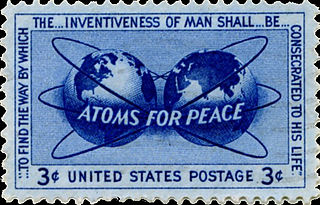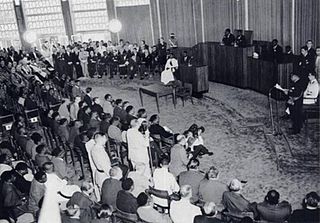 W
WThe American University speech, titled "A Strategy of Peace", was a commencement address delivered by United States President John F. Kennedy at the American University in Washington, D.C., on Monday, June 10, 1963. Delivered at the height of his rhetorical powers and widely considered one of his most powerful speeches, Kennedy not only outlined a plan to curb nuclear arms, but also "laid out a hopeful, yet realistic route for world peace at a time when the U.S. and Soviet Union faced the potential for an escalating nuclear arms race." In the speech, Kennedy announced his agreement to negotiations "toward early agreement on a comprehensive test ban treaty" and also announced, for the purpose of showing "good faith and solemn convictions", his decision to unilaterally suspend all U.S. atmospheric testing of nuclear weapons as long as all other nations would do the same. Noteworthy are his comments that the United States was seeking a goal of "complete disarmament" of nuclear weapons and his vow that America "will never start a war". The speech was unusual in its peaceful outreach to the Soviet Union at the height of the Cold War, and is remembered as one of Kennedy's finest and most important speeches.
 W
W"Atoms for Peace" was the title of a speech delivered by U.S. President Dwight D. Eisenhower to the UN General Assembly in New York City on December 8, 1953.I feel impelled to speak today in a language that in a sense is new—one which I, who have spent so much of my life in the military profession, would have preferred never to use. That new language is the language of atomic warfare.
 W
W"Britain Awake" was a speech made by British Conservative Party leader Margaret Thatcher at Kensington Town Hall, London, on 19 January 1976. The speech was strongly anti-Soviet, with Thatcher stating that the Soviet Union was "bent on world domination" and taking advantage of détente to make gains in the Angolan Civil War. She questioned the British Labour government's defence cuts and the state of the NATO defences in parts of Europe. Thatcher stated that a Conservative government would align its foreign policy with the United States and increase defence spending. She also congratulated Malcolm Fraser and Robert Muldoon for their recent election as prime minister of Australia and New Zealand, respectively, but warned of the risks of a potential communist victory in the upcoming 1976 Italian general election. Thatcher urged the British public to wake from "a long sleep" and make a choice that "will determine the life or death of our kind of society".
 W
WThe Speech at the Ceremony of the Proclamation of the Congo's Independence was a short political speech given by Patrice Lumumba on 30 June 1960 at the ceremonies marking the independence of the Republic of Congo from Belgium. It is best known for its outspoken criticism of colonialism.
 W
WThe Declaration of Conscience was a Cold War speech made by U.S. Senator from Maine, Margaret Chase Smith on June 1, 1950, less than four months after Senator Joe McCarthy's "Wheeling Speech," on February 9, 1950. Her speech was endorsed by six other liberal-to-moderate Republicans. In it, she criticized national leadership and called for the country, the United States Senate, and the Republican Party to re-examine the tactics used by the House Un-American Activities Committee (HUAC) and Senator Joe McCarthy. She stated the basic principles of "Americanism" were:The right to criticize; The right to hold unpopular beliefs; The right to protest; The right of independent thought.
 W
WThe "Evil Empire" speech was a speech delivered by U.S. President Ronald Reagan to the National Association of Evangelicals on March 8, 1983 during the Cold War. In that speech, Reagan referred to the Soviet Union as an "evil empire" and as "the focus of evil in the modern world". Reagan explicitly rejected the notion that the United States and the Soviet Union were equally responsible for the Cold War and the ongoing nuclear arms race between the two nations; rather, he asserted that the conflict was a battle between good and evil.
 W
W"Ich bin ein Berliner" is a speech by United States President John F. Kennedy given on June 26, 1963, in West Berlin. It is one of the best-known speeches of the Cold War and among the most famous anti-communist speeches. Kennedy aimed to underline the support of the United States for West Germany, 22 months after East Germany, a member of the Soviet-dominated Warsaw Pact, erected a Wall around West Berlin to prevent mass emigration to the western sectors of the city. The message was aimed as much at the Soviets as it was at Berliners, and was a clear statement of U.S. policy in the wake of the construction of the Berlin Wall. Another phrase in the speech was also spoken in German, "Lasst sie nach Berlin kommen", addressed at those who claimed "we can work with the Communists", a remark at which Nikita Khrushchev scoffed only days later.
 W
WThe Iron Curtain was a political boundary dividing Europe into two separate areas from the end of World War II in 1945 until the end of the Cold War in 1991. The term symbolizes the efforts by the Soviet Union (USSR) to block itself and its satellite states from open contact with the West and its allied states. On the east side of the Iron Curtain were the countries that were connected to or influenced by the Soviet Union, while on the west side were the countries that were NATO members or nominally neutral. Separate international economic and military alliances were developed on each side of the Iron Curtain. It later became a term for the 7,000-kilometre-long (4,300 mi) physical barrier of fences, walls, minefields, and watchtowers that divided the "east" and "west". The Berlin Wall was also part of this physical barrier.
 W
WThe Iron Curtain was a political boundary dividing Europe into two separate areas from the end of World War II in 1945 until the end of the Cold War in 1991. The term symbolizes the efforts by the Soviet Union (USSR) to block itself and its satellite states from open contact with the West and its allied states. On the east side of the Iron Curtain were the countries that were connected to or influenced by the Soviet Union, while on the west side were the countries that were NATO members or nominally neutral. Separate international economic and military alliances were developed on each side of the Iron Curtain. It later became a term for the 7,000-kilometre-long (4,300 mi) physical barrier of fences, walls, minefields, and watchtowers that divided the "east" and "west". The Berlin Wall was also part of this physical barrier.
 W
W"On the Cult of Personality and Its Consequences", also popularly known as the "Secret Speech", was a report by Soviet leader Nikita Khrushchev, First Secretary of the Communist Party of the Soviet Union, made to the 20th Congress of the Communist Party of the Soviet Union on 25 February 1956. Khrushchev's speech was sharply critical of the rule of the deceased General Secretary and Premier Joseph Stalin, particularly with respect to the purges which had especially marked the last years of the 1930s. Khrushchev charged Stalin with having fostered a leadership cult of personality despite ostensibly maintaining support for the ideals of communism. The speech was leaked to the West by the Israeli intelligence agency Shin Bet, which received it from the Polish-Jewish journalist Wiktor Grajewski.
 W
W"Restatement of Policy on Germany" is a speech given by James F. Byrnes, the United States Secretary of State, in Stuttgart on September 6, 1946.
 W
WThe shoe-banging incident occurred when Nikita Khrushchev, First Secretary of the Communist Party of the Soviet Union, pounded his shoe on his delegate-desk in protest at a speech by Philippine delegate Lorenzo Sumulong during the 902nd Plenary Meeting of the United Nations General Assembly held in New York City on 12 October 1960.
 W
W"Mr. Gorbachev, tear down this wall", also known as the Berlin Wall Speech, was a speech delivered by United States President Ronald Reagan in West Berlin on June 12, 1987. Reagan called for the General Secretary of the Communist Party of the Soviet Union, Mikhail Gorbachev, to open the Berlin Wall, which had separated West and East Berlin since 1961. The name is derived from a key line in the middle of the speech: "Mr. Gorbachev, tear down this wall!"
 W
W"We choose to go to the Moon", officially titled as the Address at Rice University on the Nation's Space Effort, is a speech delivered by United States President John F. Kennedy about the effort to reach the Moon to a large crowd gathered at Rice Stadium in Houston, Texas, on September 12, 1962. The speech, largely written by Kennedy advisor and speechwriter Ted Sorensen, was intended to persuade the American people to support the Apollo program, the national effort to land a man on the Moon.
 W
W"We will bury you!" is a phrase that was used by Soviet First Secretary Nikita Khrushchev while addressing Western ambassadors at a reception at the Polish embassy in Moscow on November 18, 1956. The phrase was originally translated into English by Khrushchev's personal interpreter Viktor Sukhodrev.
 W
WThe "Wind of Change" speech was an address made by British Prime Minister Harold Macmillan to the Parliament of South Africa on 3 February 1960 in Cape Town. He had spent a month in Africa in visiting a number of British colonies. The speech signalled clearly that the Conservative Party, which formed the British government, had no intention to block the independence to many of those territories.